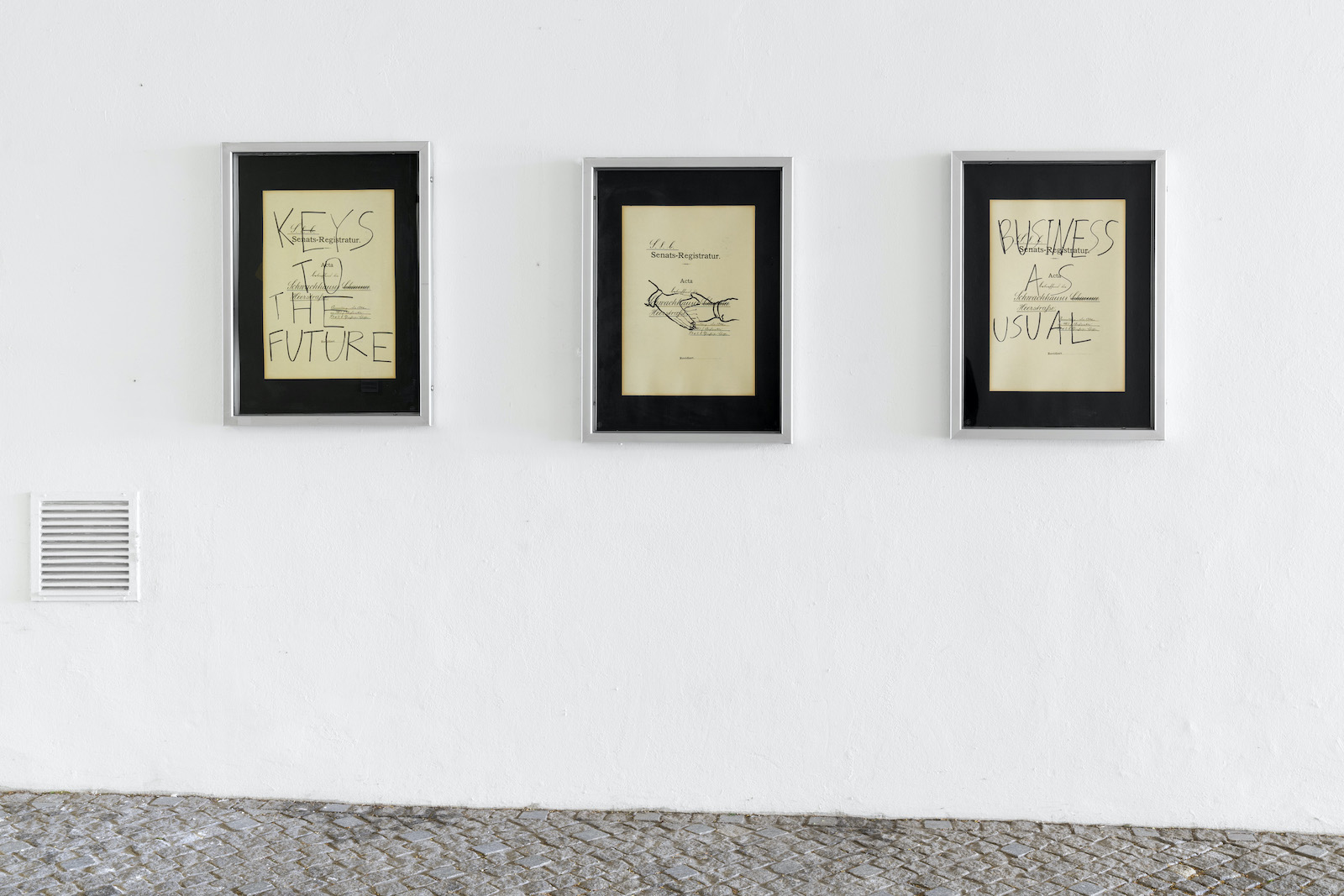
stories make worlds, worlds make stories by Bubu Mosiashvili marks the starting point of a new exhibition series in the poster frames in the GAK’s outdoor space. In five consecutive solo presentations the five invited artists take language as a starting point to intervene in the tense relationship between word and image. They disrupt conventional ways of seeing, reflect on (in)visibility and enable intimacy in the public space.
In Bremen 28 streets carry the same name: Heerstraße (military road). They characterise and intersect the cityscape, connect Bremen with the surrounding countryside, and yet their history and origins are rarely questioned. For the exhibition Bubu Mosiashvili focuses on these military roads: by walking along the streets and working in the archive, he approaches their history and present. While looking up the word “Heerstrasse” in “Bremer Lexikon. Ein Schlüssel zu Bremen,” the book redirects one to the word “Chaussee” to find the following, “The arterial roads, e.g., to Schwachhausen or Walle, were called “Chaussee” in the old Bremen and were only renamed “Heerstrasse” in 1914 when the language was cleaned up for purely patriotic reasons.” Renaming streets during the war served as “silent propaganda,” subtly reinforcing the war narrative and fostering a sense of shared responsibility. This could also strengthen civilian identification with the nation and support for nationalistic parties. Tendencies that are also inscribed in current debates about the impact of language and that need to be constantly critically reflected.
Mosiashvili questions the act of renaming, exposes the supposedly invisible power dynamics inscribed in it by overwriting the street names once again. The thoughts and impulses that come to his mind during the walks take on a central role in this process, and will be further explored during collective walks as part of the exhibition. How does these streets shape our movements through the city? Do military roads always imply a form of marching? Why are they simultaneously so present and yet invisible in our everyday lives? stories make worlds, worlds make stories can therefore also be regarded as an artistic appropriation as well as a reflection on how we perceive our paths through the city when they become ordinary and which stories are (over)looked as a result of it.
Bubu Mosiashvili (b. 1997, in Tbilisi, Georgia), is an interdisciplinary artist whose work explores blind spots of histories. He focuses on hidden and discarded memories and facts that serve as the “behind the scenes” structure for dominant narratives. Mosiashvili holds a bachelor’s degree in arts from Tbilisi State Academy of Arts in 2019 and currently pursues a diploma in fine arts at the University of Arts Bremen, in the class of Natascha Sadr Haghighian. Since 2019 he was involved in organizing a Tbilisi based multidisciplinary project space “MAUDI”, and since 2023 he runs and organizes “Library for Imagined Futures”, an artist-run library in Bremen.
Within the poster frame series “Re-Framing“
Curated by Maxie Kiwitter
Events
Thu, 25 April 2024, 7 pm
Opening and Talk
with Bubu Mosiashvili & Fritz Laszlo Weber
Fri, 26 April 2024, 5 pm
Cracking Dis/parities
Workshop with Fritz Laszlo Weber
> Registration required
Thu, 23 May, 6 pm
Collective walk: Kattenturmer Heerstraße
Thu, 13 May and Thu, 20 May, 4 pm
Swarm principles. Techniques of camouflage and other useful knowledge of movement
2-day workshop with Liz Rech
Sat, 22 June, 3 pm
Collective walk: Waller Heerstraße
Related Material
As part of the exhibition, the newspaper “& another story” was published, in which the text “Public Invisibility” was initially printed.
>Bubu Mosiashvilis Text
Funding
“Re-Framing” is made possible with the kind support of Der Senator für Kultur der Freien Hansestadt Bremen, Beate + Hartmut Schaefers Stiftung, Gemeinsam – Stiftung der Sparkasse Bremen, Freundeskreis der HfK Bremen.


















